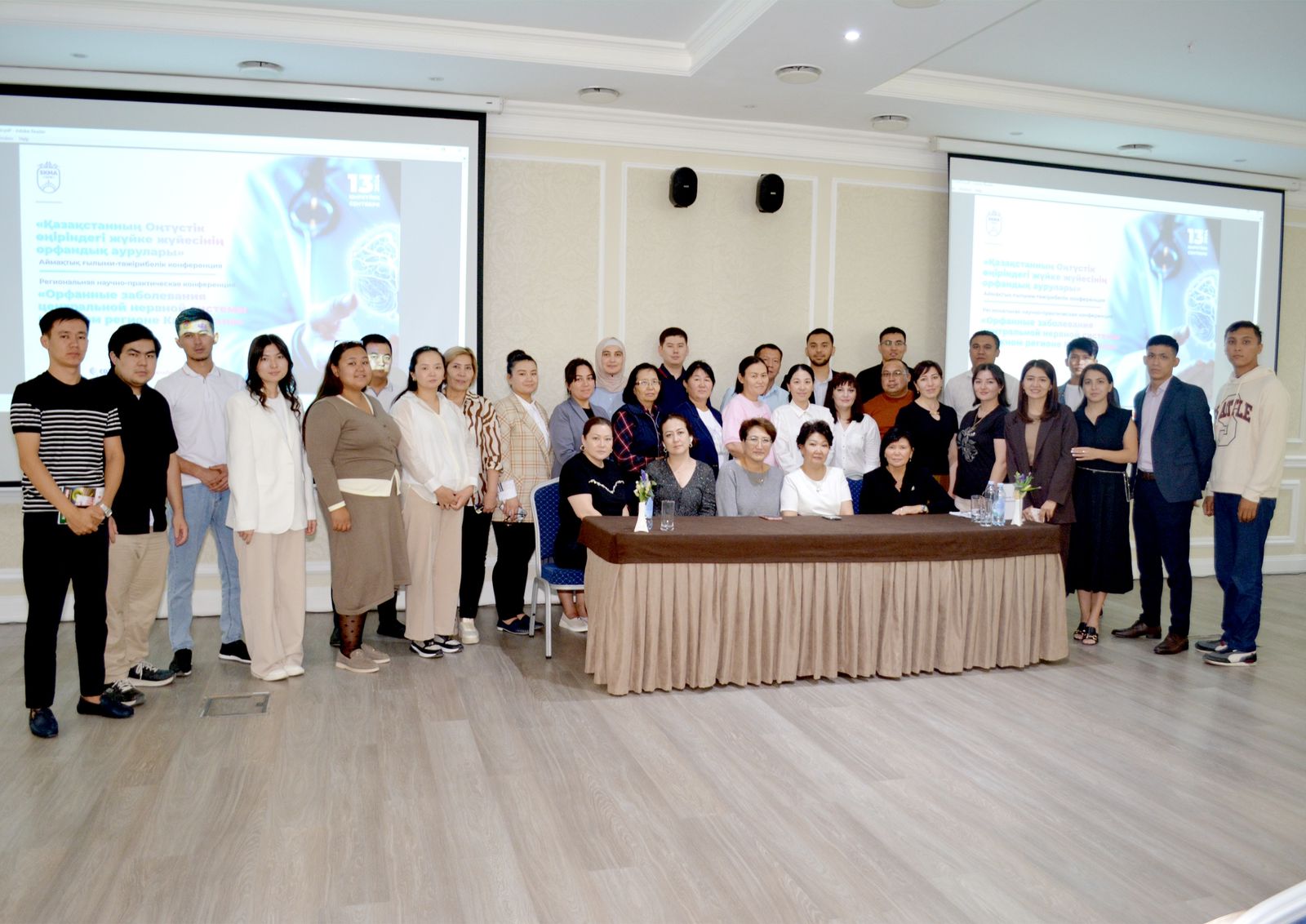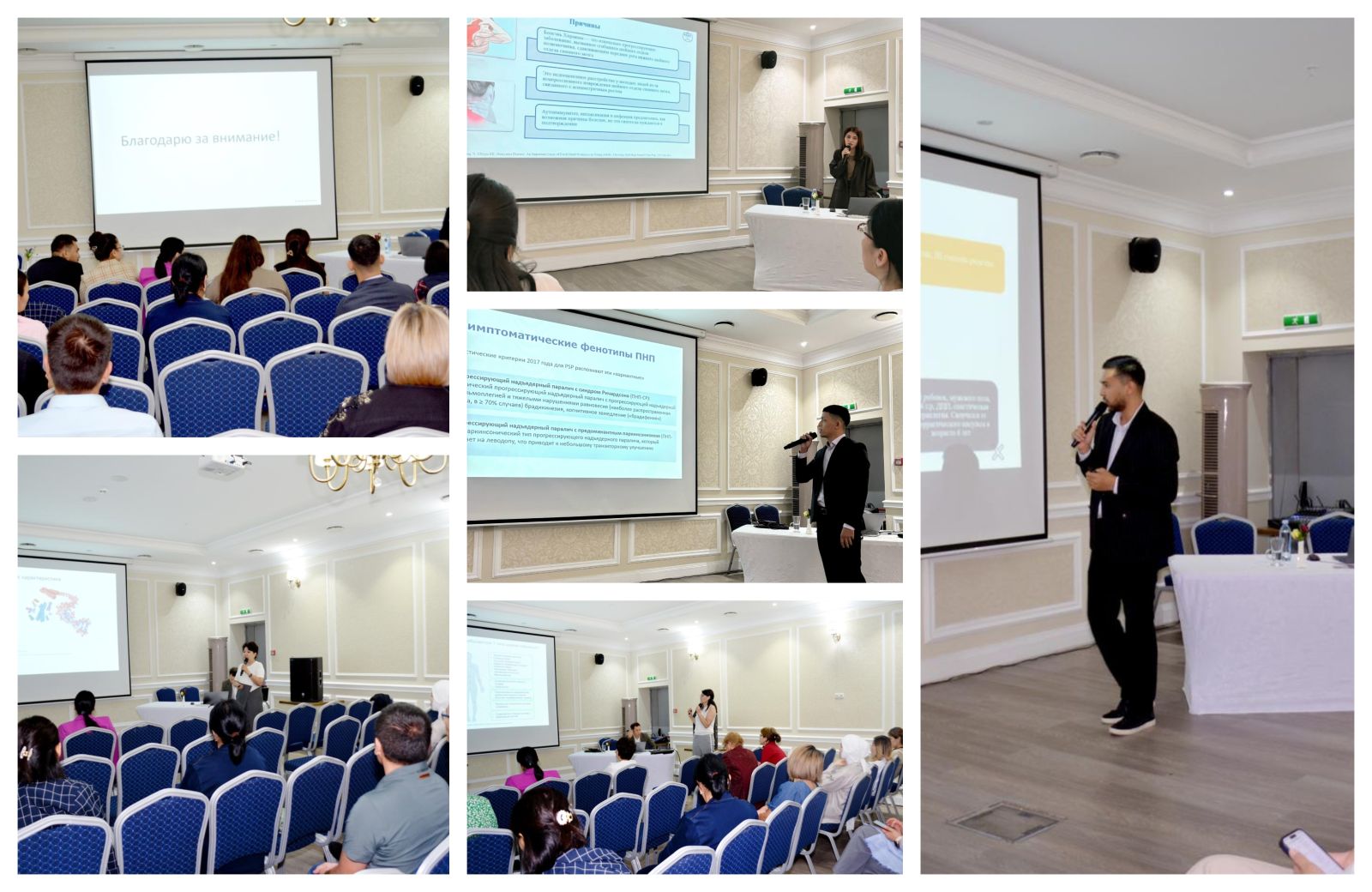Nine Circles of Hell: On Orphan Diseases and Beyond. Or How the Conference with the Participation of Neurology Residents from SKMA Went

On September 13th, 2024, a regional scientific-practical conference titled "Orphan Diseases of the Nervous System in the Southern Region of Kazakhstan" was held for neurology residents of the South Kazakhstan Medical Academy (SKMA), neurologists, and specialists from medical institutions and clinics in Shymkent and the Turkestan region.
Future young scientists training at one of the university's leading departments—neurology, psychiatry, rehabilitation, and neurosurgery—presented their scientific research on managing patients with rare diseases to a broad audience.

At the start of the conference, participants were introduced to the presentations by the following scholars:
Nurzhanova Rosa Baltabaevna, Associate Professor of the Department of Nervous Diseases with a course in Neurosurgery at the Kazakh National Medical University named after S.D. Asfendiyarov, PhD, Almaty (Diagnosis of Spinal Muscular Atrophy (SMA): Modern Methods and Approaches);
Zharkinbekova Nazira Asanovna, Head of the Department of Neurology, Psychiatry, Rehabilitation, and Neurosurgery at SKMA, c.m.s., Professor, Chief Freelance Neurologist of the Turkestan Regional Health Department, Shymkent (The Impact of Pathogenetic Therapy on Non-Motor Functions in Adult Patients);
Erkhodzhaeva Nigara Khalmakhammetovna, PhD candidate at MKTU, Turkestan (The Importance of Timely Diagnosis of Orphan Diseases);
Zhaksybek Madina Belgibayevna, Head of the Pediatric Neurology Department at the Aksai University Clinic of KazNMU named after S.D. Asfendiyarov, Master of Health, Neurologist, Almaty (Modern Experience in Diagnosing and Managing Patients with Neurofibromatosis Type 1 in Southern Kazakhstan);
Abdrayimova Saltanat Orynbasarovna, PhD candidate, Assistant at the Department of Neurology, Psychiatry, Rehabilitation, and Neurosurgery at SKMA, Shymkent (Therapy Correction in Advanced Stages of Parkinson's Disease);
Polukchi Tatyana Vasilyevna, PhD, Associate Professor at the Department of Neurology, Psychiatry, Rehabilitation, and Neurosurgery at SKMA, Shymkent (Modern Methods of Diagnosing Cognitive Disorders in Patients with Multiple Sclerosis), and others.
“To get a diagnosis, some patients with rare diseases have to go through what might be described as nine circles of hell,” says Professor N.A. Zharkinbekova, recalling Dante Alighieri’s "Divine Comedy." “Patients can become ill from birth or suddenly during adolescence. The disease progresses each year, causing harm to health. Early diagnosis alleviates the suffering of both children and adults. The causes of these diseases can vary. We advise parents and close relatives to pay attention to minor details that can help doctors in making a diagnosis. There are nuances that should not escape the attention of the general practitioner or the neurologist; it is better to double-check, consult with renowned scientists from national medical clinics, and seek advice from staff at the Department of Neurology, Psychiatry, Rehabilitation, and Neurosurgery at SKMA.”
To alleviate the suffering of patients with rare diseases, close cooperation has been established with foreign specialists and laboratories, including the Neurogenetics Laboratory at the Institute of Neurology, University College London, the Biotech Center at the University of Cambridge, Cardiff University in the UK, the Z.P. Solovyov Scientific-Practical Psychoneurological Center (Moscow, Russia), and Istanbul University Cerrahpasa (Istanbul, Turkey). Professor Henry Houlden, a neurologist and neurogeneticist from University College London, has visited Shymkent several times.
This vigilance was the theme of the presentations at the recent conference for neurology residents. Associate Professor R.B. Nurganova from the Department of Nervous Diseases at KazNMU shared a clinical case. A two-month-old baby was treated with targeted therapy drugs. If the recommendations are strictly followed, the children grow, develop, play, manage a stroller, eat independently, and move around. Orphan diseases are incurable, but qualified treatment improves their quality of life.
This was particularly emphasized by second-year residents:
Olzhas Kalzhan (Progressive Supranuclear Palsy: Case Description from Practice);
Nigora Abdumominova (Huntington's Disease: Report on an Interesting Clinical Case);
Eldar Bauyrzhan (SMA: Family Case) – on consanguinity and children with immune diseases;
Aliaskar Ruslanov (Friedreich's Ataxia: Practice Case);
Aigerim Bazarova (Pompe Disease: Family Case);
Saltanat Bekbulatova (Monomelic Amyotrophy (Hirayama Disease): Description of a Rare Disease Case);
Aigerim Bekmakhan (Multiple Sclerosis: Practice Case);
Ardak Tulebek (Myasthenia Gravis, Seronegative Variant);
Saidakhan Arybzhanova (Hereditary Polyneuropathies: Practice Case).
As all the speakers noted, orphan diseases are genetic, accompany a person throughout life, even if symptoms do not appear immediately. They affect the nervous, respiratory, muscular, cardiovascular, urinary, gastrointestinal systems, organs of vision, joints, skin, blood changes, and cause multisystemic damage that cannot be eradicated.
The conference also featured:
Aynaz Shamistanovna Aliyeva, Assistant at the Department of Neurology at SKMA, Neurologist at the Mediker Clinic, Shymkent (Case of Autosomal Dominant Neuronal Ceroid Lipofuscinosis Type 4 (CLN4));
Gauhar Eruzakovna Tolebaeva, Assistant at the Department of Neurology at SKMA (Devic's Spectrum Optic Neuromyelitis Disease, Cases);
Aynur Amirkhanovna Esetova, Assistant at SKMA (Spinocerebellar Ataxias, Cases);
Nigara Khalmakhammetovna Erkhodzhaeva, PhD Candidate at MKTU, Turkestan (Clinical Case of Mucopolysaccharidosis Type 2).
One of the main scientific directions of the Department of Neurology, Psychiatry, Rehabilitation, and Neurosurgery at SKMA, the organizer of the conference, is the study of the genetic profile of rare genetic and common neurodegenerative diseases in Central Asia and the Caucasus (CAC), including Alzheimer's Disease, Huntington's Disease, Spinocerebellar Ataxia, atypical parkinsonisms, paroxysmal CNS states, epileptic encephalopathies, neurodevelopmental syndromes, and others. Professor N.A. Zharkinbekova, along with department staff, is working on creating a collaborative biobank for Parkinson's Disease in Central Asia and the Caucasus.
The conference concluded with a summary of the work and the presentation of certificates.
 694 views
694 views
